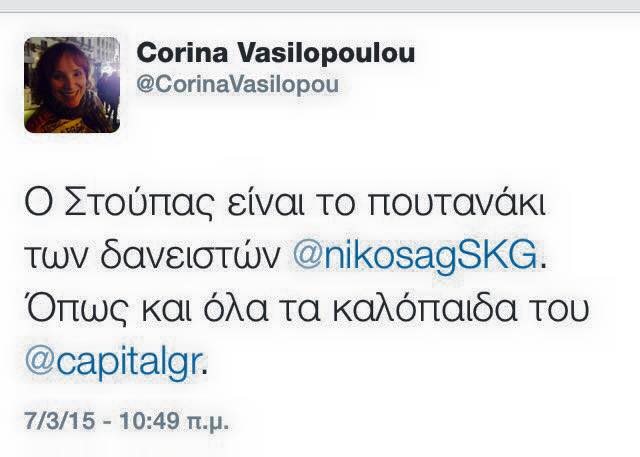Photo: kathimerini.gr
It all started not by anybody else but by Alexis Tsipras’ coalition partner and Minister of Defence Panos Kammenos. In one of his latest threats that the government "will not succumb, bow down and violate what the Greek people have ordered" he said, "When you are determined to fight for justice, you are determined to fight to the end." Then he compared the end with a gunpowder warehouse in Souli that a monk blew up as he was determined not to give the ammunitions to the Ottoman troops that besieged the village in 1803.
When a Greek journalist expressed fears that this extreme position could lead to a similar explosion, Kammenos said, "Some broadcasters, especially in the region of Piraeus, may not yet have been blown up but the Greek family has certainly been blown up."
The Greek private SKAI TV is located in the region of Piraeus, which recently has frequently attracted the attention of the government. The reason is that critical comments on the government policy can be heard during its news and other broadcasts, which apparently annoy SYRIZA and Independent Greeks.
A week ago, the television presented a document distributed to all police stations in Greece, which completely changes the immigration policy in the country. In particular, it states that the police shall not arrest any of the immigrants who have illegally entered Greece and that they will receive a document for legal stay for a period of one month, during which immigrants will be able to decide whether to leave, or stay in, Greece, and to obtain afterwards a permit for a 6-month stay in the country.
The news provoked violent reactions. Deputy Minister of Public Order and Citizen Protection Yannis Panousis accused SKAI of disseminating false information. Then subsequently it became clear that he had been sent by the Director of the Office for Migration on the orders of an assistant to Deputy Minister for Migration Tasia Christodoulopoulou. The crisis for the government ended with the early retirement of the Director of the Office for Migration. A day later, SYRIZA parliamentary representative and editor in chief of the pro-government newspaper Avgi Nikos Phyllis did not fail to shake his finger at SKAI during the morning show, "SKAI should be more careful. We do not want to hear dangerous things about immigrants," he said, specifying that he did not mean the TV broadcasts but the news.
The next attack on a journalist was against Kostas Stoupas of economic online edition capital.gr. During his participation in a TV broadcast, he was particularly critical of the policy of the new Greek government and, as a result, he was accused of being "more terrible" than the German tabloid Bild.
The heated discussions in the studio obviously annoyed other supporters of SYRIZA, such as Stoupas’ colleague Corina Vasilopoulou who defined him on her Twitter profile as the "lenders’ w..re". She added that her opinion of "all the rest in capital.gr" was the same. It is worth noting that Vasilopoulou is an assistant to governor of Attica Rena Dourou and was a candidate for regional councillor from the list of SYRIZA.

Minister of Finance Yanis Varoufakis fights his own battle against the media and individual journalists every day and on all fronts. According to sources, in the original corrective statement of the Ministry regarding his interview with Italian newspaper Corriere della Sera he had even defined it as a "grandiose example of a yellow post". The final text posted on the website of the Ministry does not contain the expression but states the following:
"In recent days we have observed cases of systematic distortion of the statements of the Minister of Finance on the part of the media. These distortions and the continuous information that there is a risk of Greece being unable to pay its obligations to the lenders are intentional or unintentional attempts to undermine the good course of the negotiations of the Greek government with the institutions and its partners."
Varoufakis began to criticize the media for having presented false information soon after his appointment, which he himself announced in his blog. First on the list was British BBC Television, which he accused of presenting inaccurate information regarding his interview in a broadcast by the same media. In addition, he noted that the host was impolite to him.
After attending his first meeting of the Eurozone finance ministers, at which he achieved success, Varoufakis began to advise journalists of world media how to write their articles. "Could I suggest that you should avoid dubious arguments that are based on even more suspicious information? This is obscene," he wrote on Twitter in a message to director of the office of the Financial Times in Brussels Peter Spiegel. A day earlier, on the same social network, Varoufakis was short with journalist Simon Dixon of the Wall Street Journal in connection with his hint that the communication between the office of the Minister of Finance and that of the Greek Prime Minister was problematic. The fact that both comments have been removed from the profile of Yanis Varoufakis probably has its importance.
Last week he drew a bead on Reuters journalist Hugo Dixon whose critical comments on Twitter that Greece was struggling to pay the loan to the International Monetary Fund and that he government was likely to impose an additional tax angered Greece’s Minister of Finance. In his reply, the Minister, commentator, said, "Only I never said that Hugo ... Your Greek needs some brushing up (or better sources)." Then the journalist attached at least two sources that proved his arguments but no new comments from Varoufakis followed.
The next day the Minister scolded a Bloomberg journalist who opposed his refusal to answer questions by the media during a pre-announced press conference. Varoufakis advised the journalist to write articles, and later a book, if he wanted. Then he told him to stop being "rude" and announced the end of the press conference that never took place.